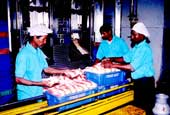 |
| Pictures by S.H. Patgiri |
 |
Guwahati: Summer of 2003. At a Zoo Narengi Road flat Meghali Barua has laid out a lavish spread of Purabi cheese, sweet curd and lassi for breakfast. Her five-year-old son laps up the lassi and asks for more.
“Purabi has become part of our everyday life. We trust it more than the other milk products in the market as it adheres to the quality control norms,” says Barua. “My kids love the cartoon, the Purabi symbol, on the glass.”
The cartoon that comes with the catchline — Pure, Fresh and Tasty — is splashed all over the town, at kiosks and bus stops. Purabi, meaning the product of the east, which has been marketed by the West Assam Milk Producers’ Co-operative Union Limited (Wamul), is ushering in a “white revolution” in Assam.
Wamul has been created on the Amul pattern and its products are in use in homes all over Assam. Today, Purabi is a symbol of several things — of high-quality milk products sold at reasonable prices, a growing co-operative and the triumph of an indigenous technology.
Many consumers believe that loose milk, which is supplied by a vendor, is fresh milk. “We are trying to generate awareness about safe and unadulterated milk among the consumers,” says J. Choudhury, managing director of Wamul.
He adds, “While some people adulterate milk with water to add to their profit, others produce something white resembling milk by adding vegetable fat, urea and detergents to augment the volume of milk collected under unhygienic conditions.”
There is also a general belief that milk is required only by children, nursing mothers and elderly people. “Milk is a storehouse of nutrients as it possesses body-building proteins, energy-giving carbohydrates and fats, bone and teeth-building calcium and phosphorous and essential life-giving vitamins,” says Brajendra Lahkar, a medicine specialist. Lahkar adds, “The rich source of calcium in milk helps prevent osteoporosis, especially in women after menopause.”
Wamul’s story dates back to 1975, when Operation Flood, the world’s largest dairy development programme, was launched in Assam. The operation, spearheaded by the National Dairy Development Board (NDDB), replicated the Anand pattern co-operative dairy infrastructure all over the country.
Under the programme, three milk producers’ co-operative unions were set up — one each in Barak valley, Upper and Lower Assam. At present, only the Milk Producers’ Co-operative Union of Lower Assam, Wamul or Purabi Dairy, is operational.
The e-boom has caught up with Wamul, too. Recently, Purabi Dairy launched its colourful and attractive website www.purabi.netfirms.com. “The website is part of the milk awareness programme and we want to reach out to a wide spectrum of people. We want to communicate with the opinion-makers,” says Choudhury.
He adds, “We are getting information and responses from unexpected quarters, organisations and institutions.” The recipe section is an added attraction of the website, which has many delicacies on display, including milk products.
The website reveals that 88.5 per cent of the households are not aware of pasteurisation of milk and 94.8 per cent do not know the implications of pasteurisation. Almost every Guwahati household is unaware of homogenisation of milk and 97.5 per cent do not know the implications of homogenisation.
Purabi Dairy now has a whole range of products like toned milk, double toned milk, ghee, cream, paneer, sweet curd, plain curd and lassi. A brand new flavoured milk, Delight, in four different varieties — kesar, pista, mango and elaichi — will be launched in the market soon. The other items on the agenda are ice cream, tea or coffee milk (skimmed).
The milk for the dairy is procured locally from the Primary Milk Producers’ Co-operative in the areas of operation — Kamrup, Nagaon, Morigaon, Goalpara and Nalbari. “No milk is purchased from private vendors or traders to ensure quality, cleanliness, hygiene and consistency and to boost the milk production by the co-operatives,” he adds.
Not many people are aware of the variation in lean-flush milk procurement. Milch animals — cows or buffaloes — do not yield milk uniformly throughout the year to maintain steady supply to consumers. “Any gap between the demand for milk and availability from the co-operatives in the area of operation of Wamul is met by procuring milk from the National Milk Grid in insulated road milk tankers at four to six degrees centigrade,” says Choudhury.
Purabi milk is marketed through a network of 348 retail outlets in Guwahati. Milk products like cream, paneer, curd and lassi are distributed through 150 retailers in the city. Milk parlours have been set up in various departmental stores of the city.
Though Purabi has recently taken several initiatives to carve a niche for itself, its past track record does not inspire confidence. Therefore, the present management has to ensure that the good work done is sustained. For, who knows, Purabi can actually become another Amul.











